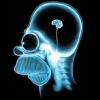I'd have to disagree. If what you're saying is the case and neurotransmitters are not at all involved in depression then why is a drug like Wellbutrin that increases dopamine effective in treating depression? Personally, I suffer from depression and anhedonia and I find drugs that increase dopamine like wellbutrin, modafinil, or adderall alleviate some if not all my depressive symptoms. My brain fog goes away, anhedonia, and of course I experience a significant boost in energy.
What I'm saying is that the main theories, although they are shifting in other directions lately, say that neurotransmitters are the cause, are the biological expression of depression. These theories are based on that there is an effect when you influence neurotransmitters. But getting an effect is not the same as 'it is the cause'. That's a fallacy. With this I don't say that wellbutrin, modafinil or adderall do not work, but that the mechanism that's causing depression can be something totally different.
One of the upcomming theories is that depression is the effect of an inflammation. Brains of depressed people were examined after they died and they had one thing in common: neuroinflammation. Now it's studied on the living. I volunteert and took part in it.
There is a form of depression that is caused by a virus.
GLYX13 is known to free people from depression for twee weeks after 1 injection. Works by a different mechanism.
That's what I tried to say.


















































